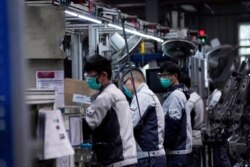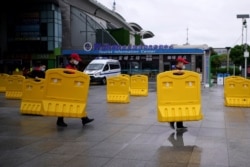Jeff Kao is a ProPublica reporter who analyzed thousands of fake and hijacked Twitter accounts to see how China spreads propaganda online.
He told VOA Mandarin he started tracking the tweets in August during the pro-democracy protests in Hong Kong after noticing “some strange accounts that just didn’t look real.”
They weren’t, something that Twitter disclosed when it released information on 926 accounts originating from China August 19.
“Overall, these accounts were deliberately and specifically attempting to sow political discord in Hong Kong, including undermining the legitimacy and political positions of the protest movement on the ground,” Twitter said.
Many of the accounts had been started by legitimate Twitter users outside China only to be hacked and repurposed by Beijing.
Twitter continued, “Based on our intensive investigations, we have reliable evidence to support that this is a coordinated state-backed operation. As Twitter is blocked in PRC, many of these accounts accessed Twitter using VPNs.”
The accounts belonged to a “larger, spammy network of approximately 200,00 accounts” that the platform suspended for violating a range of rules covering all users.
“I think when social media was created, people in general hoped that it would encourage a more open civil society, discussion of opinion would be easier,” said Vincent Wang, dean pf the College of Arts and Sciences and political science professor at Adelphi University in Garden City, New York.
“But the Chinese Communist Party (CCP) took advantage of the open society and freedom of speech in the West and made it a tool for its own propaganda against democracy,” he said.
Kao told VOA Mandarin that he noticed the accounts tweeting about Hong Kong changed. As the coronavirus spread, the accounts focusing on Hong Kong changed to focus on the epidemic initially covered up by Beijing after it was linked to a market in Wuhan selling wildlife, such as bats, for human consumption. Many coronaviruses, such as COVID-19, start out in animals and jump to humans.
As the epidemic raged through China, many of the accounts “became cheerleaders for the government, calling on citizens to unite in support of efforts to fight the epidemic and urging them to ‘dispel online rumors,’” wrote Kao. As the epidemic spread worldwide and became a pandemic, the accounts pointed out China’s response at home.
“We were not scared during the outbreak because our country was our rearguard. Many disease fighting warriors were thrust to the front lines” said one. Others pointed out Beijing’s aid to countries such as Italy to ensure the world knew of it so-called “mask diplomacy”.
Kao told VOA Mandarin that his work led him to circumstantial evidence suggesting OneSight, an internet marketing company in Beijing, was parroting “Chinese government talking points, for example, in newspaper editorials or by the Ministry of Foreign Affairs.”
However, there is more than one company working with the government, he said.
“There’s probably a lot more internet marketing firms out there [competing] for business essentially.”
The Chinese companies are developing their techniques, Kao said, and are now reaching out to prominent people on Chinese-speaking Twitter and “paying them to make favorable posts. … China is a little bit later to the scene compared to Russia. So, they are trying to figure out their tactics as well.”
Kao has watched Twitter take down accounts and networks.
“I think they do take some steps to limit fake activities on the platform. But their approach, I think could be strengthened a little bit more,” he told VOA. “Twitter often seeks to increase the cost of fake boosting for commercial purposes to the point that people who do it for a profit, they don’t do it anymore. But when it comes to political activities,” increased costs do little “to discourage the actors from acting.”
However, China’s activity is not limited to humans.
Retired U.S. Air Force Brigadier General Robert Spalding, who served on the National Security Council, told VOA Mandarin that the Chinese deploy "bots, artificial intelligence bots that are used to promote their messages and narrative."
“So, it’s a pretty vast effort, and it really makes it pretty difficult for people to understand what’s the truth, particularly if the whole thing is just designed to create one narrative,” added Spalding, now with the Washington-based Hudson Institute.
Calls to the Chinese Embassy in Washington for comment Friday evening were directed automatically to an operator, then went to music before cutting off.
Wang called for congressional hearings on nations’ use of Twitter and other platforms to spread disinformation. He wants lawmakers to find a way to protect the principle of freedom of speech while stopping the Chinese Communist Party from “making negative use of the technology for its own propaganda.”
He said he believes it would be futile to block China’s accounts.
“If you do that, China would have a lot of ways to cope with it by setting up even more new accounts.
Wang told VOA Mandarin the best way to combat China’s disinformation efforts is “to raise (the) public’s awareness, so that people using social media can understand that if a so-called news (item) is bad quality information, a lie or disinformation, no matter how many times it is repeated, even if thousands times, it still will not become truth."
The original version of this article, published March 28, 2020, incorrectly identified Robert Spalding as a current U.S. Air Force brigadier general. He is retired. VOA regrets the error.







